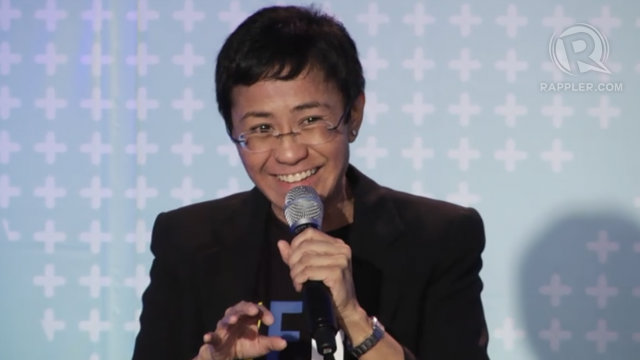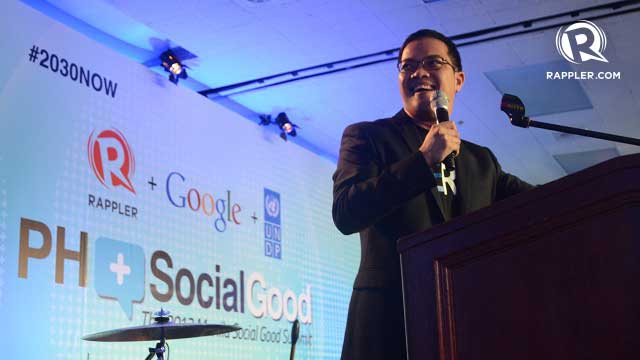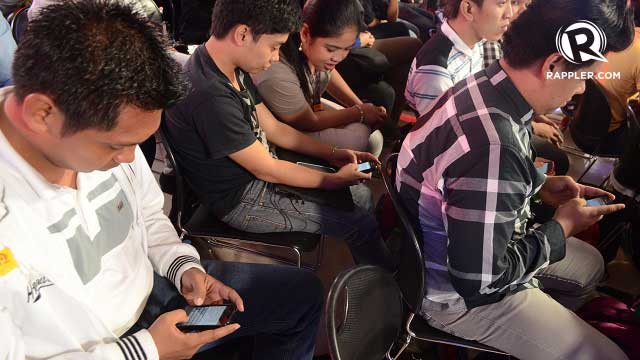SUMMARY
This is AI generated summarization, which may have errors. For context, always refer to the full article.

MANILA, Philippines – “Bawat patak ng text, or tweet, or post sa Facebook ay maaaring maging agos ng impormasyon na maghahanda sa ating harapin ang hamon ng panahon.”
(Every text message, tweet, or Facebook post may turn into a flow of information that will prepare us to face the challenges of climate.)
On Saturday, September 21, Rappler introduced Project Agos – an initiative that brings together government, the private sector and citizens to tackle climate change adaptation and disaster risk reduction.
The launch capped off the one-day PH+SocialGood: The Manila Social Good Summit, where speakers from different sectors of society talked about the different ways they used social media to address climate change.
“Now we’ll tell you how to put what we told you all day into action,” Rappler CEO Maria Ressa said.

One-stop shop
In line with Rappler’s vision to engage the community to act through compelling storytelling, Project Agos engages more stakeholders to build a platform for preparedness, response and recovery.
“Think of Project Agos as a reservoir of government [and] private sector efforts…enhanced by social media, by big data. In other words, by you, the people,” Voltaire Tupaz of Rappler’s MovePH said.
With the Philippines as the social media and texting capital of the world, Tupaz said the problem in disaster risk reduction is not the availability of information, but its fragmentation.
“What [Project Agos] does is present the most relevant information in an intuitive and useful interface customized for local government, responders, and citizens.”
Project Agos is a collaborative and long-term project that brings in more than 30 partners for top-down governance and bottom-up civic engagement.
In the next 2-6 months, Rappler along with its partners such as the United Nations Development Program, the Department of Social Welfare and Development, and the Climate Change Commission, aim to get the first phase of the platform functional.
The goal is to have the entire platform fully operational a year after it was launched to the public.
Reaching offline communities
“As someone working from the government, [I tell you]: We cannot do it alone,” Climate Change Commission Secretary Lucille Sering said.
Sering spoke earlier in the summit about how mitigating disasters become easier with knowledge.
READ: Social Media in disasters: Info as important as food, shelter
She said the government has been repairing the same risky areas in the country through the years, with much of the country’s budget only going to recovery from disasters.
“We all have these high technology and maps, [but] if we don’t capacitate them, these are really useless.”
Project Agos will help the public in visually identifying areas in need of help during disaster, and aid responders in informing those in need that help is on the way.
But for Sering, the challenge is to be able to reach out offline communities as well.

SOS
During the project launch, Rappler introduced a unified number (7622) that may be used for free during disaster.
Powered by Chikka, the number will be accessible to Smart, Globe and Sun Cellular subscribers who may send, for free, call outs for help using predesignated keywords.
The number is not active yet as of this writing, and more details on the service will be announced later.
This, along with other user-contributed data such as appeals for help and situation reports, will be automatically analyzed and plotted by Project Agos into a single web-based map that is accessible to all
The breakthrough technology behind Project Agos is social media analysis and crowdsourcing coupled with a machine learning classifier. It becomes more accurate and reliable through efforts of every stakeholder in building its articifial intelligence.
“What’s wonderful and cool with this technology is it learns from the people,” Tupaz noted.
Project Agos will also provide data overlays such as geo-hazard maps and population densities/distribution that may be used as basis for policy planning and program setting.
Step up
After launching the project, Ressa led the audience in the declaration of a unity statement: a pledge to promote, among other things, a culture of safety and resilience through social media.
READ: PH+SocialGood Summit: Unity Statement
At around 5:30 pm, members of the audience also tweeted the line “I’m stepping up to be a hero #2030NOW” – an online declaration that hopefully, through Project Agos, will translate to offline action.
– Desiree Tan/Rappler.com
Add a comment
How does this make you feel?
There are no comments yet. Add your comment to start the conversation.